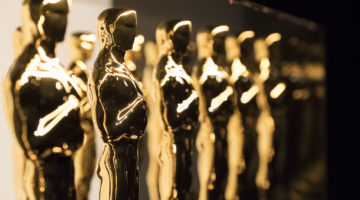Predictions are generally worthless. Unless, of course, the most intriguing new movie in theaters is “Happy Death Day” and you can’t turn on the TV without being reminded that “Young Sheldon” exists and is threatening to nuke the golden age of television. Only then is it okay to look ahead to the 90th Oscars, which won’t take place until March 4, 2018.
It helps that the Academy, while comprised of a group of wildly unstable people, is notoriously predictable in their infinite madness. They think they’re zigging when they should be zagging, but unbeknownst to them, their zag is in fact a zig, because when the number of zags becomes greater than zigs, the zag reverts back to a zig. Makes sense, right?
Without further ado, let us speculate wildly about some movies, many of which haven’t even come out yet.
Best Picture
It’s not often that a summer blockbuster ends up being the favorite for an award typically reserved for moody winter releases, but the way “Dunkirk” turned the war genre on its head makes it the frontrunner for the show’s main event. “Dunkirk” played with our concept of time and hovered from a cast of characters we never truly got to know. Instead, the focus was on the dread of war and the vulnerability of the British soldiers camped out underneath a sky dominated by the German Luftwaffe. In an era where most successful movies use a paint-by-the-numbers formula, “Dunkirk” deserves its due.
Best Director
It would be easy to dip back into the well and give this one to Christopher Nolan, the director of the aforementioned “Dunkirk,” but it might be worth going off the radar a bit and looking back to one of the best movies to drop post-2017 Oscars. Jordan Peele, most notably of “Key and Peele” fame, struck a nerve socially with “Get Out,” a racially-charged horror debut inspired by George Romero’s “Night of the Living Dead.” Keep an eye out for Denis Villeneuve as well, fresh off of “Blade Runner 2049,” but it’s notoriously difficult for sequels to win one of the major awards.
Best Actor
The rich get richer, and in the case of Daniel Day-Lewis, it’s entirely deserved. Day-Lewis, the only three-time Oscar winner (“My Left Foot,” “There Will Be Blood,” and “Lincoln”) is pairing up with director Paul Thomas Anderson once again for “The Phantom Thread,” a winter release which follows a fashion designer in 1950’s London. Rumors are also swirling that this will be Day-Lewis’s final film before retiring for what would essentially be the fourth time. It might be as much of a lifetime achievement award as it is a Best Actor award, but the G.O.A.T. has earned his hardware. His main competitor will likely be Gary Oldman, who, by all accounts, spliced his DNA with the great British leader Winston Churchill for “Darkest Hour.”
Best Actress
Everything points to Sally Hawkins winning for first Oscar for “The Shape of Water,” but watch out for Frances McDormand to pick up another Best Actress after stealing the show as the pregnant police officer who cracks a botched kidnapping case in 1996’s “Fargo.” McDormand is starring in Irish writer/director Martin McDonagh’s “Three Billboards outside Ebbing, Missouri,” which has garnered strong acclaim on the film festival circuit. Meryl Streep will certainly push both Hawkins and McDormand for her role in “The Post,” but unlike Day-Lewis, Streep doesn’t have any plans to retire soon so the Academy will likely realize she has another 150 or so Oscar nominations in her before she hangs it up.
Best Original Screenplay
The award for best original screenplay grows in prestige a little more every year as Hollywood factory-assembles more and more reboots and sequels. The aforementioned McDonagh loves to break the mold and popular convention, as evidenced by his first two screenplays, the cynically hilarious “In Bruges” and “Seven Psychopaths,” an irreverent tale of dog-napping and writer’s block. If you believe the third time’s the charm, “Three Billboards outside Ebbing, Missouri” should deliver and free us from the shackles of the 17th “Spiderman” reboot of the last decade.
Best Cinematography
Roger Deakins. “Blade Runner 2049.” Watch 10 seconds of the movie and it will become abundantly clear. That is all.











